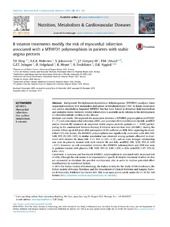B vitamin treatments modify the risk of myocardial infarction associated with a MTHFD1 polymorphism in patients with stable angina pectoris
Ding, Yunpeng; Pedersen, Eva Ringdal; Johansson, Stefan; Gregory III, Jesse F.; Ueland, Per Magne; Svingen, Gard Frodahl Tveitevåg; Helgeland, Øyvind; Meyer, Klaus; Fredriksen, Åse; Nygård, Ottar
Peer reviewed, Journal article
Published version

Åpne
Permanent lenke
https://hdl.handle.net/1956/15291Utgivelsesdato
2016-06Metadata
Vis full innførselSamlinger
Originalversjon
https://doi.org/10.1016/j.numecd.2015.12.009Sammendrag
Background: Methylenetetrahydrofolate dehydrogenase (MTHFD1) catalyzes three sequential reactions that metabolize derivatives of tetrahydrofolate (THF) in folate-dependent one-carbon metabolism. Impaired MTHFD1 flux has been linked to disturbed lipid metabolism and oxidative stress. However, limited information is available on its relation to the development of atherothrombotic cardiovascular disease. Methods and results: We explored the association between a MTHFD1 polymorphism (rs1076991 C > T ) and acute myocardial infarction (AMI), and potential effect modifications by folic acid/B12 and/or vitamin B6 treatment in suspected stable angina pectoris patients (n Z 2381) participating in the randomized Western Norway B Vitamin Intervention Trial (WENBIT). During the median follow-up of 4.9 years 204 participants (8.6%) suffered an AMI. After adjusting for established CVD risk factors, the MTHFD1 polymorphism was significantly associated with AMI (HR: 1.49; 95% CI, 1.23e1.81). A similar association was observed among patients allocated to treatment with vitamin B6 alone (HR: 1.53; 95% CI, 1.01e2.31), and an even stronger relationship was seen in patients treated with both vitamin B6 and folic acid/B12 (HR: 2.35; 95% CI, 1.55 e3.57). However, no risk association between the MTHFD1 polymorphism and AMI was seen in patients treated with placebo (HR: 1.29; 95% CI, 0.86e1.93) or folic acid/B12 (1.17; 95% CI, 0.83e1.65). Conclusion: A common and functional MTHFD1 polymorphism is associated with increased risk of AMI, although the risk seems to be dependent on specific B vitamin treatment. Further studies are warranted to elucidate the possible mechanisms, also in order to explore potential effect modifications by nutritional factors.
